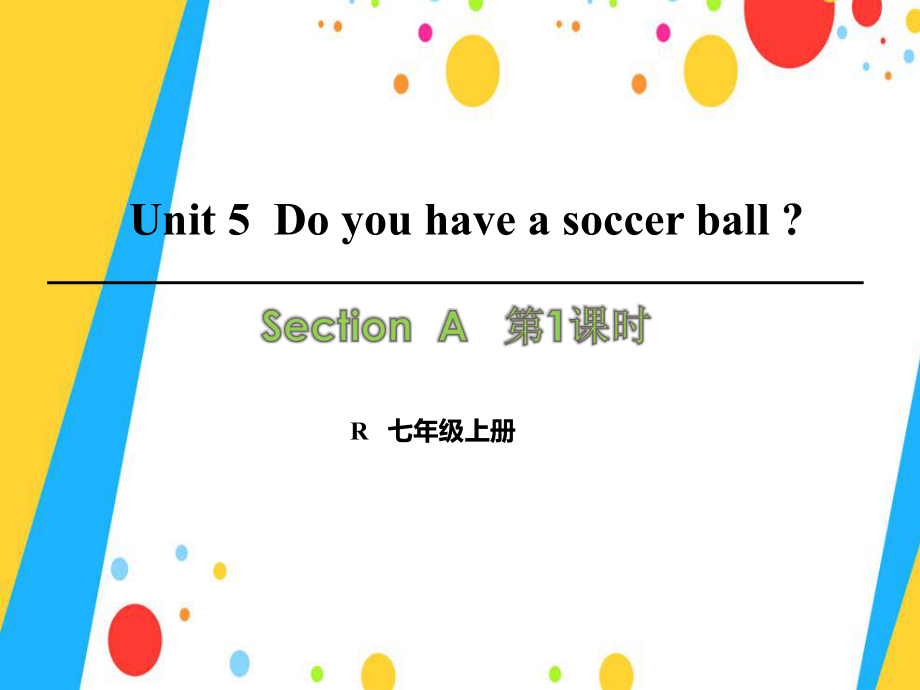《七年級英語上冊 Unit 5 Do you have a soccer ball(第1課時(shí))Section A(1a2d)課件 (新版)人教新目標(biāo)版》由會員分享���,可在線閱讀����,更多相關(guān)《七年級英語上冊 Unit 5 Do you have a soccer ball(第1課時(shí))Section A(1a2d)課件 (新版)人教新目標(biāo)版(25頁珍藏版)》請?jiān)谘b配圖網(wǎng)上搜索���。
1���、R 七年級上冊Unit 5 Do you have a soccer ball ?Lead-in play baseballplay volleyballplay basketballDo you ?Make sentences.play baseballplay volleyballplay basketballNew words soccer _soccer ball _tennis _tennis racket _ ping-pong _ping-pong ball _ping-pong bat _volleyball _basketball _英式足球英式足球( (運(yùn)動運(yùn)動) )( (
2、英式英式) )足球足球 網(wǎng)球網(wǎng)球網(wǎng)球拍網(wǎng)球拍乒乓球乒乓球( (運(yùn)動運(yùn)動) ) 乒乓球乒乓球乒乓球拍乒乓球拍 排球排球籃球籃球短語連線短語連線1. 網(wǎng)球網(wǎng)球A. soccer ball2. 乒乓球拍乒乓球拍B. sound good3. 足球足球C. tennis ball4. 棒球拍棒球拍 D. ping-pong bat5. 聽起來不錯(cuò)聽起來不錯(cuò)E. baseball bat1aMatch the words with the things in the picture.1.tennis ball_2.ping-pong bat_3. soccer ball_4.volleyball _5.
3���、basketball _6.baseball bat_afcedb1bListen and circle the words you hear.ping-pong bat soccer ballvolleyball ping-pong ball1cA: Do you have a ping-pong bat?B: Yes, I do.A: Do you have a ping-pong ball?B: No, I dont.Practice the conversation with your partner. Then ask and answer questions about the t
4����、hings in the picture above.Do you have a baseball?Play rolesYes, I do.Do you have a baseball bat?No, I dont.2aListen to the conversations. Number the pictures 1-4.2342bListen again. Match the people with the balls.3242cAsk and answer questions about the people in 2a.Does Jane have a tennis ball?Play
5��、 rolesNo, she doesnt.Role-play the conversation2dCindy: Hey, Helen, lets go! Were late.Helen: OK. Cindy: Do you have the baseball?Helen: Yes, I do. Its in my bag.Cindy: And wheres our baseball bat?Helen: Bill has it.Cindy: Oh, yeah. And do you have your jacket?Helen: Oh, no, I dont. Its on the chair
6����、. Let me get it.Cindy: And your hat, too!Helen: OK, I have my jacket and hat. Lets go!Language pointsDo you have the baseball?do的用法:的用法: 作助動詞�����,無詞義�,幫助構(gòu)成否定句或疑問句����;作助動詞���,無詞義���,幫助構(gòu)成否定句或疑問句;在簡略答語中�,用在簡略答語中,用do來代替原句中的實(shí)義動詞���;有來代替原句中的實(shí)義動詞�����;有時(shí)用于肯定句����,目的是為了加強(qiáng)語氣。時(shí)用于肯定句���,目的是為了加強(qiáng)語氣����?���?隙ɑ卮穑嚎隙ɑ卮穑篩es,主語(代詞)主語(代詞)+ do/does.否定回答:否定
7、回答:No,主語(代詞)主語(代詞)+dont/doesnt.Do you have a basketball?你們有一個(gè)籃球嗎�����?你們有一個(gè)籃球嗎�����?Yes, we do./No, we dont. 是的����,我們有。是的�,我們有���。/不,我們沒有�����。不��,我們沒有���。動詞動詞have的用法的用法 (1) have意為意為“有有”, 強(qiáng)調(diào)強(qiáng)調(diào)“所屬關(guān)系所屬關(guān)系”, 其第三人稱其第三人稱 單數(shù)形式是單數(shù)形式是has。 (2) have為實(shí)義動詞為實(shí)義動詞, 表示疑問或否定時(shí)常借助于助動表示疑問或否定時(shí)常借助于助動 詞詞do或或does��。have/has和和there be結(jié)構(gòu)結(jié)構(gòu)I have a comput
8���、er. 我有一臺電腦����。我有一臺電腦�。There is a book on the table. 桌子上有一本書。桌子上有一本書���。have/hasthere be表示表示“有有”時(shí)時(shí), 側(cè)重于主觀方面?zhèn)戎赜谥饔^方面, 有有“歸歸所有所有”的意思的意思, 常用于常用于“某人某人 (某物某物) 有有”的句型�。的句型。表示表示“有有”時(shí)時(shí), 側(cè)重于客觀存在側(cè)重于客觀存在, 常用于常用于“某某地地 (某時(shí)某時(shí)) 有某人有某人/某物某物”的句型的句型, 至于此物屬至于此物屬于誰則無關(guān)緊要���。于誰則無關(guān)緊要�����。. 用所給單詞的適當(dāng)形式填空用所給單詞的適當(dāng)形式填空1. Where is the basketbal
9�、l? Lets (ask) our teacher. 2. My brother (have) a soccer ball. 3. you (have) a tennis bat? Yes, I do. 4. your sister (have) a computer game? 5. Where (be) your ping-pong bat? In my schoolbag. Exercise askhasDohaveDoeshaveis. 單項(xiàng)選擇單項(xiàng)選擇1. Ia ping-pong ball and Bobtwo ping-pong bats. A. have; have B. ha
10���、ve; has C. has; has D. has; have2. Jim wants to play basketball, but hea basketball. A. have B. has C. dont have D. doesnt have3. your sister have a volleyball? No, she. A. Do; dont B. Does; dont C. Does; doesnt D. Do; doesnt4. My soccer ballunder the bed. Letget it. A. are; we B. are; me C. is; we D. is; me5. youa tennis ball? Yes, I do. A. Do; have B. Do; has C. Does; have D. Does; has 同學(xué)們�����,這一課學(xué)習(xí)的單詞你們都掌握了嗎��?現(xiàn)在大同學(xué)們�,這一課學(xué)習(xí)的單詞你們都掌握了嗎����?現(xiàn)在大家來檢驗(yàn)一下,點(diǎn)擊下面的視頻開始聽寫吧家來檢驗(yàn)一下�,點(diǎn)擊下面的視頻開始聽寫吧!
 七年級英語上冊 Unit 5 Do you have a soccer ball(第1課時(shí))Section A(1a2d)課件 (新版)人教新目標(biāo)版
七年級英語上冊 Unit 5 Do you have a soccer ball(第1課時(shí))Section A(1a2d)課件 (新版)人教新目標(biāo)版

